CIA Sponsored Terror, Civil Liberties, Criminalizing Dissent, Habeas Corpus, Human Rights, Political Prisoner, Prison Industry, Surveillance, Truth to Power
Podcast: Play in new window | Download
Updates:
—-
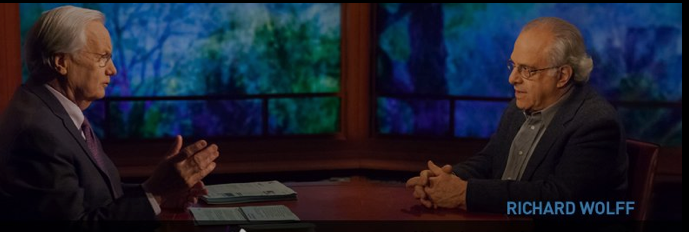
Economic Update: Professor Rick Wolff
We welcome back returning guest Professor Rick Wolff to get an economic update. Recent news of Janet Yellen emerging as a frontrunner to succeed Ben Bernanke as Federal Reserve chairman garnered the support of many Democrats in the House and Senate, yet she urged to lower payments for senior citizens on Social Security and voted to repeal the Glass-Steagal Act. Meanwhile, President Obama with the support of the Republican Party has targeted Social Security and medicare for cut backs. We talk about these topics and more with Professor Rick Wolff who hosts Economic Update on WBAI Saturdays at Noon.
Professor Rick Wolff:
- The Federal Reserve is an enormously important institution all of the time.
- It has nothing less than the mandate in this economy to control and manage and manipulate the monetary system.
- It is a wonderful reality to throw at anyone who thinks we live in a free market economy where the government plays a marginal role.
- When the government controls the quantity of money and the cost of borrowing it, its not a marginal role, its most central role a government can play.
- We have a dysfunctional Congress and President who can’t figure out what to do, unwilling to take serious steps to deal with this crisis, leaving it to the Federal Reserve.
- We are now in the worst economic crisis since the Great Depression.
- Clearly, now that we’re entering the 6th year of this calamity, and we have huge unemployment, huge foreclosures, the Federal Reserve also failed to make it short and shallow it is in fact long and deep.
- Ms. Yellen’s nomination would go through quickly and more smoothly than Summers would have. Obama and his folks don’t want a big review of how they manage the economic system since its an unmitigated disaster.
- Enough extreme right Republicans exist now in the House of Representatives to make serious the threat of denying the Federal Government the right to raise the debt ceiling.
- The President has already signaled his willingness to compromise with Republicans around Social Security, Medicare and Medicaid.
- There’s a long standing debate about measurements on the cost of living. That’s a very difficult thing to do and perfectly reasonable economists disagree.
- All they’ve done is picked the one that looks the smallest (cost of living for Social Security) to use as a benchmark to therefore give the smallest increase.
- The first thing you should understand, which is an outrageous injustice, is that the money for Social Security is only withheld from a wage or a salary.
- It’s not withheld if you earn interest income, if you earn dividend income or if you earn capital gain income.
- That’s why the tax for Social Security is called a payroll tax.
- Currently, its a payroll tax but its only on the first 113 thousand dollars a year that you earn.
- For every dollar above 113 thousand, you don’t pay anything.
- Saez and Piketty
- The inequality of wealth in the United States has gotten much worse in the last 30 years and more interesting has gotten worse across this crisis.
- That’s interesting because in the Great Depression, the crisis collapsed the gap between the rich and the poor.
- The top ten percent of American income earners this last year 2012, took home more than half the total income.
- Ten percent have half the income and the other 90 percent share the other half.
- The 400 richest people in America have more total net worth than half the population.
- There’s been movement of sheer outrage of what it means when you read about this extraordinary wealth that some people are earning 7.25.
- There are signs of upset within the United States beginning to build around this. (inequality of wealth)
- We have a minimum wage at the federal level, 7.25. We also have state minimum wages that vary all over the place.
- We have now a situation where wealth is so concentrated at the top that the folks who have that wealth understand perfectly the situation. They love the way the economy is going. They’re gathering the wealth into their own hands, but they’re not stupid.
- They understand that when you concentrate wealth that much you’re creating an impossible tension between an ostensibly democratic political system where universal sufferage means the mass of people vote on the one hand, and their concentrated wealth.
- “We have to worry that the political system will be used by the masses to undo politically the benefits we get economically.”
- A billionaire from California buys the Washington Post and a billionaire from Boston, buys the Boston Globe.
Guest – Richard D. Wolff is Professor of Economics Emeritus, University of Massachusetts, Amherst where he taught economics from 1973 to 2008. He is currently a Visiting Professor in the Graduate Program in International Affairs of the New School University, New York City. Democracy At Work.
—-
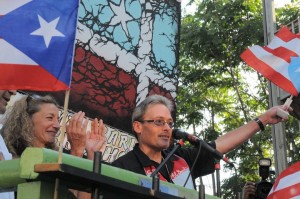

Lawyers You’ll Like – Attorney Jan Susler
Attorney Jan Susler joined the People’s Law Office of Chicago in 1982. Before that she worked as a Clinical Law Professor at the legal clinic at Southern University’s School of Law, Prison Legal Aid. Susler continues to her litigation and advocacy work on prisoner’s rights issues and also represents people wrongfully imprisoned, falsely arrested, strip searched or subjected to excessive force by police officers.
Attorney Jan Susler:
- The National Lawyers Guild was an amazing refuge. When I went to law school women were 10 percent of the class and really resented.
- It was a hostile environment, lots of rich white boys who thought they were all that.
- The GI Bill actually even things out class-wise which was a delight.
- I worked at Legal Aid, while I went through law school it kept me sane. My first job was at Law School Clinic.
- We provided civil legal services to state prisoners.
- Through the process of doing abortion rights work, anti death penalty work and prisoner’s rights work through the Guild, and then I met the folks at the People’s Law Office.
- Even to today, there’s only a handful of people who do that work and we tend to know each other.
- Michael Deutsch whose been my law partner for the last 3 decades called me up and said we have a couple of Puerto Rican radicals who have been sent to the state prison near where you’re doing your work and you need to go see them. They’re quite at risk the state considers them to be enemies.
- I knew nothing about Puerto Rico being a US colony, having been invaded, them resisting colonialism. I learned about international law making it a crime against humanity.
- They really opened my world, what gift its been for me.
- The National Lawyers Guild created a Puerto Rican project to work with Puerto Rican lawyers and activists in the Independence Movement and people who were trying to get the Navy out of the small Puerto Rican island of Vieques.
- It’s culminating in this wonderful convention we’re going to have in the middle of October in San Juan.
- There’s going to be a panel and workshop on the death penalty in Puerto Rico which the US imposes on its colony.
- There will be workshops about labor, and political prisoners.
- I think people in this country understand who Nelson Mandela is and what he stood for and sacrificed and what he meant for his country. These men and women are the same for the people of Puerto Rico.
- They were artists and working in universities. Most had college degrees, but really understood that colonialism is a crime against humanity.
- They organized clandestinely into an organization called the Armed Forces for National Liberation. They were arrested in the early 1980s and accused of seditious conspiracy.
- My job was to advocate for their human rights and educate about their situation. They refused to accept the jurisdiction of a US court.
- For the National Lawyers Guild, I’ve gone to the United Nations Decolonization Committee to present.
Guest – Attorney Jan Susler, In her 36 years as a lawyer, Jan Susler has worked with the Puerto Rican Independence Movement and with progressive movements challenging U.S. foreign and domestic policies. She was an adjunct professor of criminal justice at Northeastern Illinois University, and taught constitutional law at the University of Puerto Rico. Attorney Jan Susler joins us today as a guest on our Lawyers You’ll Like series.
——————————————————————
Civil Liberties, Criminalizing Dissent, Death Penalty, Habeas Corpus, Human Rights, Political Prisoner, Prison Industry, Surveillance, Torture, Truth to Power
Podcast: Play in new window | Download
——
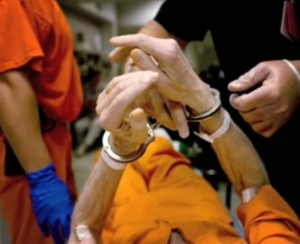

Corrections Association Program Releasing Aged Prisoners
Here on Law and Disorder we’ve reported about the Compassionate Release Program regarding Lynne Stewart’s condition. The CRP is designed to reduce the number of elderly and sick in prison, if they have a terminal health condition or a significant and permanent non-terminal health condition, disease or syndrome. This program is part of a larger effort to release aging prisoners in the United States. Nationally, the number of prisoners over age 55 nearly quadrupled from 1995 to 2010, eight times the pace of growth for the total prison population, according to a recent Human Rights Watch report. Because of long sentences handed out in the 70’s and 80’s, American prisons now serve as quasi-nursing homes, albeit lacking the long-term care we associate with geriatric facilities. We talk today about a major new initiative called the Corrections Association Program Releasing Aged Prisoners that’s working to make prison parole boards correctly assess elderly prisoner risk and get them out.
Laura Whitehorn:
- In New York State, there are about 9200 at the moment above the age of 50.
- By 2030, its estimated that about a third of the entire incarcerated will be over the age of 40. There will be at least 400 thousand.
- For the last 20 years this country has been drunk on the concept of lock em up and throw away the key.
- You lock em up and throw away the key. . .they’re gonna get old.
- Our project is called Releasing Aging People In Prison.
- These people have done a lot of time and the lowest rate of recidivism is in this group. They’re over the age of 50, have done 15-20 years in prison and have committed murder.
- This group is ready to be released without a threat to public safety.
- You’ve advocated for Lynne Stewart on this show for compassionate release. She’s in the Federal System.
- The Feds are very stingy with compassionate release, so is the state of New York. In 2011, I think it was, they let out 8 people on compassionate release, in a year when 200 people died in the system.
- I’m now 68, but I feel about 78 on some days.
- We don’t really need a new law to release the people we’re talking about.
- What we need is the parole board to follow the law. What we need is the state to follow the law for compassionate release for those who are ill.
- One thing we’re doing is we’re trying to join with other people in the state who’ve had enough of the way that parole board denies people over and over again and say use actual risk assessments that do exist.
- If the risk is low let them go.
- RAPP – Release Aging People In Prison – Harlem, NY – 2090 Adam Clayton Blvd, NY – 212-254-5700
- Email – mfarid@correctionalassociation.org
- www.nationinside.org/campaign/release-of-aging-people-in-prison
Mujahid Farid:
- The issue of mass incarceration has many facets. The impact on some communities is from the cradle to the grave.
- The prison population has somewhat stabilized. It’s still at a rate that beats out every other country. Although that rate has stabilized it hasn’t done so with the elderly.
- In New York State, the prison population has gone down 24 percent in the last 10 years.
- During that same 10 years the population of the elderly (in prison) increased by 64 percent.
- The zeitgeist in this country is about punishment and never giving up on punishing a person, especially those committed for serious crimes.
- In my own case, I had a sentence of 15 years to life, you would assume if I did the minimum sentence, if there were indications I had rehabilitated myself and shown that I was a changed person that I would’ve been released. But that didn’t happen. I served 18 years above and beyond that 15 year sentence.
- The sentencing structure that allows what we’re talking about is called an indeterminate sentencing structure. That means you’re given a minimum and a maximum.
- Some people get 10 to 20, some people get 10 to 15, and other with the most serious crimes get a number and on the end they get letters.
- In that indeterminate sentencing structure, there’s an indication that the prisoner should be released if they’re reformed or rehabilitated at that minimum posed term.
- In my case, I received a 15-life on attempted murder of a police officer. He didn’t get a scratch.
- That was the least amount imposed on me, I couldn’t get any less.
- So a person who is serving a sentence such as that would have an expectation of 15 years or whatever they have to be released if they change.
- To not give them a reason for the denial, saying its the nature of the crime, takes away hope from a person.
- I was arrested in 1978, I went upstate within 6 months. Before that 6 months came I had earned my GED. I did that while facing trial.
- I went upstate with no expectation of serving 15 years. I actually thought that because of the facts I was convicted for that I would eventually win on appeal.
- Within a few years, I had earned an Associates Degree in Business. I went on and got a Bachelor’s Degree in Liberal Arts.
- Shortly after that, I earned a Master’s Degree in Sociology and then I earned another Master’s Degree in Ministry.
- All of that happened before that 15 year period.
- None of that was considered by the parole board when I entered that 15 year mark.
- They simply denied me and didn’t give me any guidance of what I could do to better myself to earn release.
Guest – Laura WhiteHorn is an ex-political prisoner and native New Yorker, who was active in supporting groups such as the Black Panther Party, the Black Liberation Movement and was active with Students for a Democratic Society and the Weather Underground. Laura also worked to expose the FBI’s Counter Intelligence.
Guest – Mujahid Farid is investigating potential mechanisms for increasing release rates for incarcerated aging people at the Correctional Association in New York. He’s spent more than three decades incarcerated in New York and co-founded the Prisoners AIDS Counseling & Education program and helped design prison-based sociology and theology courses that allowed others to earn college-credited in prison. He also earned four college degrees and other certifications while in prison, including his paralegal certificate, New York State Department of Labor Certificate in Human Development Counseling, and New York City Department of Health Certificate in HIV/AIDS Counseling.
——-
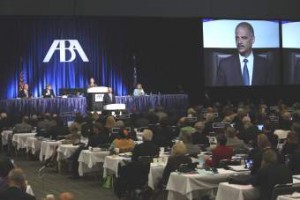
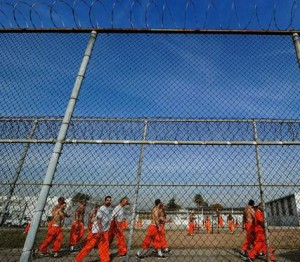
Mandatory Minimum Sentencing Circumvented For Non Violent Drug Offenders
When Attorney General Eric Holder announced that the Justice Department would begin reassess the harsh mandatory minimum sentences on non-violent drug offenders that unfairly target young African Americans and Hispanics, some drug reform advocates said it was a breakthrough. However, our guest Ethan Nadelmann, executive director of the Drug Policy Alliance, says there was no mention of clemency or pardons for those imprisoned with disproportionately long sentences. Attorney General Holder did mentioned that the United States represents about 5 percent of the world’s total population and it incarcerates nearly 25 percent of the world’s prison population. The Drug Policy Alliance has made great strides in criminal justice reforms and to help decriminalize marijuana in states such as Colorado and Washington.
Ethan Nadelmann:
- Early on in the first term, President Obama and Attorney General Holder working with Drug Policy Alliance and a whole range of allied groups did actually change the penalties, the mandatory minimum for crack cocaine.
- Then they dropped the ball. They did nothing in the following years.
- The substance of the speech (recent by Holder) was important. By saying he was going to issue explicit directives to US attorneys around the country that would effect the way they charge people especially low level players in drug trafficking organizations. They’re really pushing this through in a bipartisan way.
- I think he (Holder) does regard this as a legacy issue.
- Obama has recently mentioned incarceration and the need to reduce it in the context of memorializing Martin Luther King Jr.
- We’ve seen the drug law violators from 65 percent of the total of federal prisoners to 48 percent of the total even as the absolute numbers have gone up.
- I think we’re going to see low level drug violators charged in different ways. One thing about mandatory minimums is they shift the discretion from judges to prosecutors.
- Mandatory minimums empower prosecutors at the hand of judges.
- I think what we’ll see is a downshifting in how much prosecutors are looking for. We’ll see fewer people going to prison on federal drug charges.
- Legislators are notoriously resistant to having sentencing reforms be retroactive. They’re willing to say going forward we’ll reduce the sentence but we’re not going to touch the issue of the people who are locked up under the old laws.
- I bet we would see some movement on behalf of the people who are behind bars as well.
- Non violent drug law offenders, sitting there for 10 or 20 years. Statewide 20 percent of all inmates are in for drugs and in the federal prisons its 50 percent.
- Half of all drug arrests in America are for marijuana. Overwhelmingly for marijuana in small amounts.
- When states move forward with the ballot initiative process to legalize marijuana either for medical purposes, which 20 states have now done, or more broadly for all adults which Washington and Colorado have done, that presents a basic issue for the federal government.
- What the US attorney general’s office can do is offer guidelines saying to US attorneys around the country, here are our priorities, here’s how we think you should handle this.
- The feds are basically saying, we get it. That legally regulating marijuana may accomplish the objectives of federal drug control, more effectively than continuing an ineffective prohibitionist policy.
- New York was one of 11 states that decriminalized the possession of marijuana of less than ounce, back in the 70s. Which means you could have less than ounce in your pocket or home and its like a traffic ticket.
- But if its in public view, than you can be arrested. It’s a misdemeanor offense.
- New York is the only state in the Northeast that hasn’t legalized medical marijuana.
- Every 2 years we organize the leading gathering in the world of people who are against the drug war. (reformconference.org) Denver, CO – Oct 4, 5, 6
Guest – Ethan Nadelmann, founder and executive director of the Drug Policy Alliance, the leading organization in the United States promoting alternatives to the war on drugs.
——-
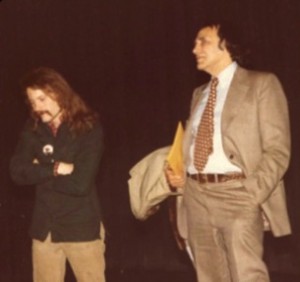
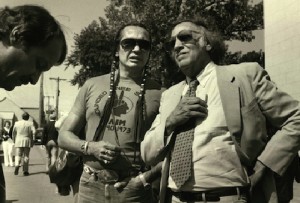
William Kunstler’s Performance at Caroline’ Comedy Club
We hear a part of William Kunstler’s presentation at Caroline’s Comedy Club. This was his last public appearance. He shares a great story about a particular dialogue with a judge and an envelope of marijuana.
———————————————————————–
Afghanistan War, CIA Sponsored Terror, Civil Liberties, Criminalizing Dissent, Human Rights, Prison Industry, RFID, Surveillance, War Resister
Podcast: Play in new window | Download
Updates:
—–

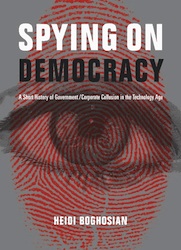
Spying on Democracy: Government Surveillance, Corporate Power, and Public Resistance Part II
This is part 2 of our interview with our own Heidi Boghosian who wrote the newly published book is titled Spying On Democracy: Government Surveillance, Corporate Power, and Public Resistance and it reveals in detail how the government acquires your information from sources such as telecommunications companies to compile a data base on “persons of interest.” Since ex-CIA staffer Edward Snowden’s release of top secret documents to the Guardian and Washington Post many are now aware of the frequency and scope to which they are being monitored. What this book has unveiled is how your personal consumer data is being gathered, bundled and sold. The spying, the collecting of phone records, accessing your online activity, all of it is unconstitutional says Heidi Boghosian, co-host of Law and Disorder and the National Lawyers Guild’s Executive Director.
Attorney Heidi Boghosian:
- They create dossiers of our spending habits, of our communication habits.
- The corporations benefit from this which makes them create more equipment for surveillance and almost makes it impossible for the government to perform traditional government functions because they’re so reliant on corporate partners.
- There’s also a revolving door among CEOs of these big companies and high level positions within government intelligence.
- The National Lawyers Guild was spied on by the FBI. More than 1000 agents were assigned to us for nearly 3 decades. They rummaged through our members garbage. We had an infiltrator in Washington DC serving as a staff person.
- They tried to label us (and failed) as a subversive organization.
- The People’s Law Office had also been monitored for years. Apparently across the street from the office an apartment was taken by the FBI who spied on them for their work representing politically active individuals.
- With all of this spying, the chilling effect of knowing that you may be spied on, you conversations may be listened to, changes the way you do business.
- I’ve always been interested in cooperation between municipal public police and private security organizations.
- We’re seeing an entire industry giving birth to Stratfor and other intelligence organizations that exist just to conduct intelligence be it on activists or critics of corporate or government policies, as well as defense contractors beefing up and creating a whole sector of intelligence.
- They are in big contracts with the US government.
- One of the problems constitutionally is they’re not held as private businesses to the same strictures as the US Constitution as we saw recently with the Hemisphere program revelations. We have our government paying AT&T staff to sit next to drug enforcement officers and go through AT&T’s files that go back 26 years. They’re not overseen by a judge.
- My question is how many more agencies of the government are doing this?
- They are getting access to this information through what’s called administrative subpoenas.
- Many mannequins have small cameras embedded in the eyeballs.
- When you’re spying on the fourth estate as its called which is intended to be a watch dog on government you really get to the heart of what democracy is about.
- Without a free press, we don’t have any chance of preserving those fundamental freedoms of First Amendment association and the ability to bring our grievances to the government for redress.
- A student group working with the Coalition of Immokalee Workers got suspicious because a new member on their listserve started asking questions and they did some research and found she owned her own private security company, in fact she was spying on them for Burger King.
- Congress is calling for an investigation for these large data aggragators. Once again, there’s no oversight, there’s no accountability, they go to a variety of sources to gather personal information on us. Some in the public domain, others not.
- They have vast troves, electronic dossiers on each of us.
Guest – Heidi Boghosian, executive director of the National Lawyers Guild. She is the co-host of the weekly civil liberties radio show Law and Disorder on Pacifica’s WBAI in New York and over 40 national affiliates. She received her JD from Temple Law School where she was the editor-in-chief of the Temple Political & Civil Rights Law Review. She also holds an MS from Boston University and a BA from Brown University.
—–
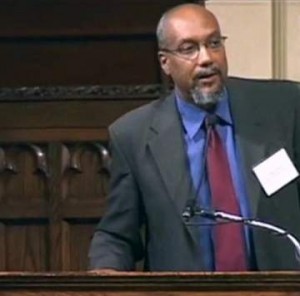

Syria: U.S. Humanitarian Intervention
What is the difference between an illegal war and humanitarian intervention? At the 2005 United Nations World Summit, government leaders agreed unanimously that “each individual State has the responsibility to protect its populations from genocide, war crimes, ethnic cleansing and crimes against humanity.” If a state fails to protect its own citizens from such atrocity as its known, the agreement implies a collective responsibility of humanitarian intervention upon other agencies. President Obama has threatened to use military force against Syria and recently commented during a speech that “we cannot and must not turn a blind eye to what happened in Damascus” The US, however has in the past, turned a so called blind eye to other alleged chemical weapons attacks in other countries. Why would President Obama now want to go forward with a Navy missile strike in Syria and try to do so without UN Security Council approval?
Ajamu Baracka:
- There’s no basis in international law that allows the US or any sovereign state to take that kind of unilateral action.
- This notion of humanitarian intervention and this responsibility to protect, is a particular type of creation that’s been cooked up in the west that has provided some kind of moral justification to engage in unilateral action on behalf of the world community.
- To circumvent the United Nations and impose their own vision and understanding of international order on any nation they see fit.
- This is no more than a dressed up, rearticulation of the white man’s burden.
- This notion that the US and the European, ex-colonial nations, have a right and a responsibility to impose their particular interests and world views on the rest of humanity is a notion that needs to be rejected but its something that many people in the west have embraced.
- It was the foundation for the NATO intervention of Libya. It has been the justification for intervention in Kosovo.
- It’s been very skillfully implanted into the minds of many people in this country as a justification for unilateral actions on the part of the US or in conjunction again with European allies.
- What about the images we were bombarded with, the rows of piled up bodies in Egypt? Why are those lives less important than those who died in Syria?
- Is it the mode in which they were murdered, gas as opposed to US supplied weapons?
- I think the US objective is the dismemberment of the Syrian state. They are in almost a win-win situation. Either they affect regime change and allow this motley crew of oppositional forces much aligned with jihadist movements, come to power or they force the state to become a non-functional state.
- The long term objective is to further isolate Iran, to diminish the power of Russia.
- Right at the moment when it was clear that the Assad government had turned the tide militarily on the ground, the US decided it was going to intervene to effect the equalization of forces in Syria.
- The US found itself in a very unique isolated position. Kerry has been given an opportunity to pull back from this ill-advised strike.
- I think the Obama Administration is one of the most effective weapons ever deployed against the progressive and radical movement here in this country, perhaps in the whole post-war period.
- He had been the answer to Ronald Reagan, but even a more effective communicator.
- A more effective demobilzer if you will. (Obama Administration) has demobilized the anti-war movement, it has disarmed radicals, confused traditional liberals.
- I think we use this last incident to intensify the conversations around exposing the interests of this administration.
Guest – Ajamu Baraka, Longtime activist, veteran of Black Liberation Movement, Human Rights defender, Former founding director of US Human Rights Network, currently Public Intervenon for Human Rights with Green Shadow Cabinet, member of Coordinating Committee of Black Left Unity Network and Associate Fellow at IPS.
———————————————————————–
CIA Sponsored Terror, Civil Liberties, Criminalizing Dissent, Habeas Corpus, Human Rights, Military Tribunal, Political Prisoner, Prison Industry, Surveillance, Truth to Power, Uncategorized, War Resister
Podcast: Play in new window | Download
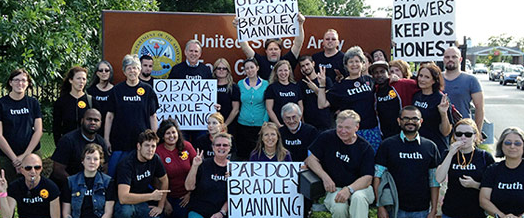
Army PFC Bradley Manning Sentenced To 35 Years
Our own Michael Ratner reports back from Fort Meade, Maryland on the day Army PFC Bradley Manning was sentenced to 35 years in prison for leaking classified information to Wikileaks. As reported by Michael Ratner, Manning faced a maximum of 90 years in prison after his conviction last month on charges of espionage, theft and fraud. Now, his sentence goes the Army Court of Criminal Appeals, where he may seek a reduction of his prison term.
Attorney Michael Ratner:
- 35 years is a completely off the wall sentence. First of all he shouldn’t have been prosecuted at all.
- That’s been the Center for Constitutional Rights position. That’s my position.
- He’s a whistle-blower, he exposed torture, criminality, killing of civilians.
- Then, they over prosecute him, charge him with espionage, make whistle-blowers into spies.
- They charge him with all these years, then people are relieved when gets 35 years.
- It’s a very long sentence for someone who actually gave us the truth about Iraq, about Iran, about the helicopter video that killed a Reuters journalist, about the diplomatic cables that gave us the secret war in Yemen, the revelations about the corrupt Ben Ali government in Tunisia that helped bring on the Arab Spring.
- He’s a hero. The people who committed the crime are sadly still in our government enjoying their lives, they’re the ones that ought to be prosecuted.
- We’re in a time where there is a sledgehammer taken to whistle-blowers.
- The demand now is that Obama pardon him or give him clemency. That’s from the Bradley Manning Support Committee.
- Because of Bradley Manning, people like Ed Snowden came forward. They understood that when they see criminality, they’re young people of conscience and they act on it, and we should be very proud of each of these people.
Law and Disorder Co-host Attorney Michael Ratner, President Emeritus of the Center for Constitutional Rights (CCR), a non-profit human rights litigation organization based in New York City and president of the European Center for Constitutional and Human Rights (ECCHR) based in Berlin. Ratner and CCR are currently the attorneys in the United States for publishers Julian Assange and Wikileaks. He was co-counsel in representing the Guantanamo Bay detainees in the United States Supreme Court, where, in June 2004, the court decided his clients have the right to test the legality of their detentions in court. Ratner is also a past president of the National Lawyers Guild and the author of numerous books and articles, including the books The Trial of Donald Rumsfeld: A Prosecution by Book, Against War with Iraq and Guantanamo: What the World Should Know, as well as a textbook on international human rights.
——-

Journalist Barrett Brown Faces 105 Years In Prison
Journalist Barrett Brown has spent more than 330 days in pre trial detention and faces charges that add up to a 105 year sentence. What Barrett Brown did was merely take a link from a chat room and copied that link then pasted it to a chat room for a wiki-based crowd source group called Project PM. The link was to the Stratfor hack information of 5 million emails. He needed help to sift through the data and posted the link that was already publicly out there to the attention of the editorial board of Project PM. There were unencrypted credit card numbers and validation codes within those emails and the government is claiming that Barrett Brown was engaged in credit card fraud. Why go after Barrett Brown? The backstory begins with the Bank of America being concerned that Wikileaks had specific information. They go to the Department of Justice who lead them to a big law firm in Washington DC, then to a private intelligence firm. Meanwhile, a defense fund for Barrett Brown continues to raise money for his case.
Kevin Gallagher:
- Barrett Brown is an investigative journalist and freelance writer who has had a career writing for the Huffington Post, the Guardian and many other places.
- Through his observing the media landscape over the last ten years in America, I think he grew very dissatisfied with things so when this phenomenon called anonymous popped up in 2010, making major news headlines, he attached himself to it.
- All he was doing was looking at this information leaked by Jeremy Hammond out of Stratfor as part of his journalistic inquiry into the world of private intelligence firms.
- The fact that they can indict someone on identity theft and credit card fraud just for sharing a link of information. . there’s no allegation that he sought to profit from it.
- Project PM over its lifespan was a number of different things but that’s what it eventually evolved into.
- A crowd sourced project with a wiki that was devoted to investigating soley, the state corporate alliance on surveillance. This was known as Team Themis, a consortium of these firms.
- This all started when Wikileaks said it had information from the Bank of America.
- Barrett was investigating. There are other journalists who do very good work on this. He was one of the most vocal who was involved in investigating all these relationships between the private intel firms and the DOJ. He was using leaked emails to do so.
- I think they were very upset to see these things revealed.
- Barrett recognized that this was a threat and he was looking into it.
- Before the court right now is a motion for a media gag order which was presented by the prosecution which would silence Barrett and his attorneys from making statements to the media.
Guest – Kevin Gallagher, writer, musician and systems administrator based in western Massachusetts. He graduated with a B.A. in English from the University of Massachusetts, Amherst. He’s currently pursuing activism on issues related to digital rights: freedom of information, privacy, and copyright; while also taking an interest in information security. He is the director and founder of Free Barrett Brown, a support network, nonprofit advocacy organization and legal defense fund formed for the purpose of assisting the prominent internet activist and journalist, Barrett Brown, who is the founder of Project PM.
——
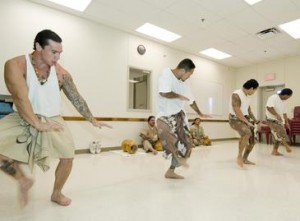
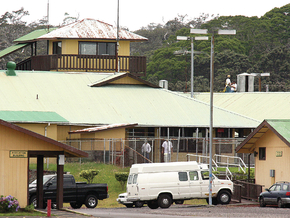
Native Hawaiian Prisoner Transfer to Arizona Private Prison
Hawaii is know for sending more prisoners across state lines than any other state. According to the Native Hawaiian Legal Corporation, a disproportionate number of those prisoners are Native Hawaiian inmates. Because of over crowding, Native Hawaiian inmates are transferred from a Hawaii state prison to a for-profit Corrections Corporation of America prison in Arizona. This particular CCA private prison however was built specifically for Native Hawaiian inmates, yet they’re denied cultural and religious rites. Additional transfer impacts include difficult reentry back into Hawaii, away from family and homeland, and no opportunity for proper atonement.
Attorney Sharla Manley:
- We’ve been involved in a lawsuit for 2 years concerning the impact of Hawaii’s policy of transferring inmates to the mainland. Native Hawaiians.
- Native Hawaiians are the indigenous people of the state of Hawaii. They have a similar experience to American Indians on the continent.
- Our firm focuses on Native Hawaiian rights and the focus on what self determination remains despite the history.
- Native Hawaiians are disproportionately incarcerated. They are transferred more often than any other racial group.
- The state of Hawaii creates a menu of prisoners, for private prisons to select.
- Our focus on the transfer is very narrow, the Native Hawaiian prisoners who still want to adhere to native traditions and practices.
- In Arizona you don’t have access to cultural teachers and spiritual advisers who could provide the kind of guidance or counseling, really the kind of instruction of passing on a tradition.
- The Native Hawaiian women were being transferred for a period of time, but there were so many sexual assaults, the state finally brought them back.
- You’re taking away the men, breaking the cultural transmission because many of these men are fathers, grandfathers. Yes they would be in prison here, but there is a difference when your family can see you on the weekends.
- In effect, it’s a form of cultural genocide.
- I’m beside myself as to why this hasn’t been rectified at this point. There’s not even a plan really.
- This is an issue that is personal for me. I am Native Hawaiian, and know what its like to have someone in your community, in your family to be effected by the criminal justice system.
Guest – Attorney Sharla Manley, with the Native Hawaiian Legal Corporation. Sharla Manley joined NHLC as a staff attorney in 2010. Before joining NHLC, Sharla was an associate at an international law firm in Los Angeles in its global litigation department for over three years. In addition to handling commercial litigation matters, she also took pro bono cases, involving voting rights, asylum, and California’s Unruh Civil Rights Act. Also, Sharla was an associate at a plaintiff-side class action firm where she primarily handled appeals of wage and hour cases before state appellate courts and the Ninth Circuit. Before law school, Sharla was a policy analyst on Native Hawaiian rights at the Office of Hawaiian Affairs. She focused on water rights and the impact of military activities on cultural resources in Makua Valley.
—–
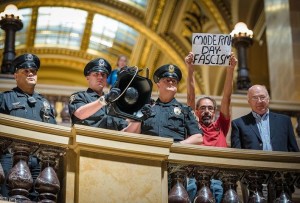

Solidarity Sing A Long: Wisconsin Labor Protests Continue
The noontime sing-along has protested Gov. Scott Walker’s policies daily at Wisconsin’s Capitol since March 11, 2011. However, a new round of arrests began two weeks ago and more than 100 citations have been issued to protesters by Capitol Police. But this is in addition to nearly 200 citations already since July 2012 when the Department of Administration began enforcing new permitting requirements for gatherings in state facilities. What is the noontime solidarity sing-along protest?
Attorney Jonathan Rosenblum:
- When you have a new governor who within weeks in office describes his legislation as a bomb, which was to end collective bargaining for public sector workers.
- This led to more than a hundred thousand people, multiple times on the square where I’m sitting right now here on Wisconsin Avenue.
- Beyond the anti-union agenda, this governor has come in with a pedigree from ALEC, the American Legislative Exchange Council. He as a legislator in the same building was a member of ALEC, was a proponent of its agenda.
- His agenda as it moved along, was to remove vast numbers of children from medicaid, of claiming a jobs agenda would bring Wisconsin to the top in the United States, instead it plunged to the bottom.
- He eliminated funding for high speed trains, instead the trains for Wisconsin are now sitting in Oregon.
- The main point about this governor is about closing the doors of this government to the public.
- Even the union legislation that led to the crowds was passed in violation of a Public Meetings Act.
- Let me take you to March 11, 2011 when it all started. I was standing there with my friend Steve Burns, folks had slept in the capitol for weeks, the anti-union legislation was passed and signed that day and Steve had printed up a few copies of a songbook that had the dome of the capitol opening up with musical notes on the cover of it and 10 tunes, the classics of the civil rights movement.
- Several of them modified in the great Wobbly tradition.
- This sing-along has preceded from that day March 11, 2011 without skipping a beat, every single week day since that date. More than 650 consecutive sing-alongs.
- The sing-along is a joyful conglomeration. It’s reached about 300-400 daily as the crack down has actually caused a surge of concerned citizens to join us.
- We Don’t Want Your Millions, Mister.
- A Long Range Acoustic Device is being used. The police have started to use the recordings of Chief Irwin’s declaration of unlawful assembly to blast into the rotunda so nobody misses it.
- They use the siren that ramps up to 150 db to disable people. They haven’t put it to that level yet.
- The State Capitol Police are in a bind. They have their orders, most are executing them with a little more zeal than they should. Some of them seem to be maintaining friendships that they had before with the singers.
Guest – Jonathan Rosenblum, PRWatch.org contributor, an author, award-winning journalist, and practicing lawyer. His book, Copper Crucible: How the Arizona Miners’ Strike of 1983 Recast Labor-Management Relations in America (Cornell University Press, 1995; Second Edition, 1998) was named as one of Princeton University Library’s “Ten Noteworthy Books in Industrial Relations and Labor Economics” in 1996.
——————————————————————————–
CIA Sponsored Terror, Civil Liberties, Criminalizing Dissent, FBI Intrusion, Habeas Corpus, Human Rights, Political Prisoner, Prison Industry, Supreme Court, Surveillance, Torture, War Resister
Podcast: Play in new window | Download
Updates:
—-
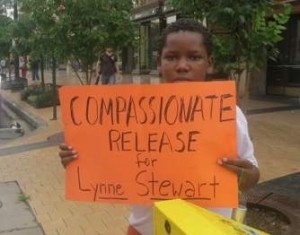

Lynne Stewart: Compassionate Release Decision
Last week Federal District Court Judge Koetl in New York stated he couldn’t consider Lynne Stewart’s request for compassionate release because by law the request needs to come from the Federal Bureau of Prisons. Judge Koetl also pointed out that the Bureau of Prisons didn’t properly consider Lynne’s medical evidence by saying her condition was improving. Meanwhile, Lynne’s doctors have given her a prognosis of 24 to 18 months to live.
Attorney Jill Shellow Levine:
- One of the things his opinion makes clear (Judge Koetl) is that the Bureau of Prisons under the statute makes a motion, he will swiftly and compassionately view the motion.
- Our application would have required him to think outside the box. I think he’s reluctant to do that at least now.
- You can continue your letter writing campaign to the director of the Bureau of Prisons in Washington DC. You can contact your Congress people both on the Senate side and the House side and urge them to get involved and to make known to the director that this is important to them.
- Those are probably the things that count the most.
- Please call to push for Lynne’s release from prison.
- U.S. Bureau of Prisons Director Charles E. Samuels – 202-307-3198 Ext. 3
- U.S. Attorney General Eric Holder – 202-514-2001
- President Barack Obama – 202-456-1111
- Please Write to: Charles E Samuels Jr. / Federal Bureau of Prisons / 320 1st Street Northwest / Washington DC 20534
Guest – Attorney Jill Shellow-Levine, Lynne’s attorney and National Lawyers Guild member.
—–

One Nation Under Surveillance Campaign: Partnership For Civil Justice Fund
In the wake of leaks about the National Security Agency’s massive surveillance program, many ask what legal steps to stem the pervasive breach of civil liberties. We’ll talk with attorney Carl Messineo from the Partnership for Civil Justice Fund about their campaign One Nation Under Surveillance. Years before 9/11 the Partnership was engaged in litigation and advocacy about the ways in which the government and corporations spy on individuals.
The FOIA request reads in part: “The people of the United States have an urgent need for disclosure of the requested information regarding what appears to be the largest covert surveillance program directed against them in U.S. history. The U.S. government and its agencies that are carrying out these unprecedented surveillance programs are not entitled to hide these programs from the public.”
Attorney Carl Messineo:
- One Nation Under Surveillance campaign is a composite of multiple programs that the PCJF has undertaken to challenge and to fight against the surveillance state.
- The program includes public records demands, FOIA requests, lawsuits, litigation as well as campaign and advocacy.
- We’ve been looking at the issue of anti-terror authorities and surveillance authorities being misused to target law abiding people in the United States and in particular those engaged in political activity, well before even 9/11.
- These anti-terror and surveillance authorities, while they were pumped up dramatically after 9/11 were actually being utilized to disrupt, to monitor, surveil, peaceful, political activists even before that catastrophic event occurred.
- The monitoring is done at the behest of private corporations and that’s revealed most clearly in the public records disclosure that we have secured as related to the Occupy Movement.
- Those documents reveal corporations working hand in glove with law enforcement to surveil, to counter, to disrupt the political messaging that this grassroots peaceful movement had.
- This is a movement that came about because of tremendous economic insecurity. People are one pay check away from not being able to meet their basic needs.
- The Wall Street corporations sit in the command centers of law enforcement, so that they have free access to the same flow of information.
- What Manning and Snowden have revealed to us is really a clarion call to action.
- What the NSA does intercept comprehensively, gmail communications, telephone logs of all of our communications.
- Who is that targeting? It’s targeting the law abiding person in the United States. Think about it for a second. What competent terrorist is going to be relying on gmail or google in order to conspire or plan?
- The “undernet” is not being captured. The virtual private networks.
- It completely eliminates the concept of privacy. The privacy implications are staggering. It’s all been done secretly, with secret courts in the United States.
- Senators who had knowledge of this information, and critical of the programs did not possess the First Amendment right to bring or focus attention to these details by citing specifics because they were under gag orders.
- We certainly know the surveillance complex is massive. Edward Snowden didn’t access the top secret documents that he did by working at the NSA. He had to work as a private contractor at Booz Allen.There’s a huge profit incentive. The use of permanent war. There must be a declaration of war in order for emergency powers that are ancillary to those powers to come into effect.
- There needs to be public debate before there is war. But a new concept was developed under the Bush Administration and is perpetuated under the current.
- The notion that there is a permanent state of undeclared war.
- Anti-crime and anti-terror authorities have been used by the government as tools.
- This is a predominant threat of having these tools of social and political control out there and systematically deployed so that the government and the corporations with who they work hand and hand, can anticipate, can know and can suppress and disrupt, democratic action. The lifeblood of a democracy.
- The government governs only by consent and that’s part of the violation here of all of this secrecy.
- A new debate is starting across this county of how do we seize control over these technologies.
- What we’re doing at the Partnership for Civil Justice Fund is a combination of activism and litigation.
- The government has operated in secret because it fears the public’s reaction.
- We have filed public records demands with the NSA, the FBI, the CIA, with other defense and military entities because that’s who is doing this. It’s coming out of the military.
- Our requests demand disclosure to the public, what are the record keeping systems, what are the safeguards, what are the rules, what are the authorities?
Guest – Attorney Carl Messineo, legal director and co-founder of the Partnership for Civil Justice Fund.
———


The Struggle Continues: Seeking Compensation for Vietnamese Agent Orange Victims, 52 Years On
The long term damage left by Agent Orange upon millions of Vietnamese, and the many thousands of U.S. soldiers has yet to be properly accounted and compensated for. Agent Orange’s long term damage set upon the ecosystems of Vietnam 52 years later include long term poisoning of soil and ground water, and near permanent destruction of mangrove forests. Chemical companies such as Monsanto and Dow have profited from defoliant chemical and has paid very little to settle veteran’s lawsuits for Agent Orange related illnesses. Meanwhile, second and third generation of Vietnamese civilians are seriously effected by Agent Orange exposure.
Attorney Marjorie Cohn:
- Studies show that between 2 million 4 hundred thousand and 4 million 8 hundred thousand Vietnamese and tens of thousands of Americans were exposed to Agent Orange during the spraying of Vietnam from 1961 to 1971.
- The Department of Veterans Affairs recognizes certain illnesses and diseases as being associated with the use of Agent Orange. Lists diseases. . .
- During the Nixon Administration there was a promise, in 1973 as part of the Peace Accords that were signed in Paris. The Nixon Administration promised to contribute 3 billion dollars toward reconstruction and healing the wounds of war and that money has not been forthcoming.
- The chemical companies, Dow and Monsanto paid a pittance to settle a lawsuit to compensate unintended victims for Agent Orange related illnesses.
- The intended victims, the Vietnamese sued the chemical companies in U.S. Federal Court and were unsuccessful. But the lawsuit spawned to hold the United States accountable for using these dangerous chemicals.
- HR 2519, The Victims of Agent Orange Relief Act of 2013. It would provide medical and rehabilitative compensation to Vietnamese victims of Agent Orange and medical services for children of U.S. Vietnam veterans and Vietnamese Americans who have been born with these same diseases and birth defects.
- It would also remediate or clean up hot spots which have been contaminated by dioxin.
- Dioxin is the culprit in Agent Orange. Dioxin the most toxic chemical known to science.
- The US government and the chemical companies did know about it (harmful effects) and they covered up a report and it wasn’t until the late sixties that they stopped spraying Agent Orange because of the negative publicity.
- Now it falls to the Peace Accords in 1973.
- Vietnam Agent Orange Relief and Responsibility Campaign. I would urge everyone to make sure your Congress person is a co-sponsor of HR 2519. The Victims of Agent Orange Relief Act of 2013.
- Obama who was 14 at the time of the Vietnam War, has come out with a campaign to which looks to rewrite the history of the Vietnam War in a way that actually lies about what the U.S. did in Vietnam.
Guest – Attorney Marjorie Cohn, professor at Thomas Jefferson School of Law and on the board of the Vietnam Agent Orange Relief and Responsibility Campaign. Her latest article The Struggle Continues: Seeking Compensation for Vietnamese Agent Orange Victims, 52 Years On, details a strategy for compensating victims of the Agent Orange chemical.
—————————————————————-
CIA Sponsored Terror, Civil Liberties, Criminalizing Dissent, Human Rights, Military Tribunal, Political Prisoner, Prison Industry, Surveillance, Torture, Truth to Power
Podcast: Play in new window | Download
Updates:
—–
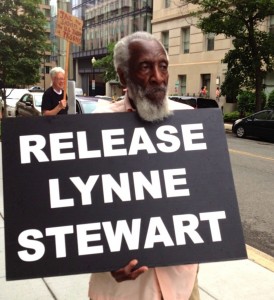
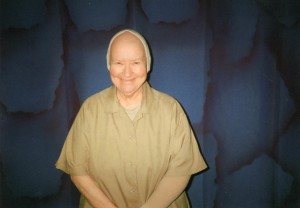
Lynne Stewart: Continued Support For Compassionate Release From Prison
As many listeners know, political prisoner, attorney, activist and friend attorney Lynne Stewart was denied compassionate release on the grounds that her health is improving. Not only is that untrue, it’s cynical. Cancer has spread to her lungs as Lynne is held in isolation. Her white blood cell count is so low that she is at risk of generalized infection. Lynne was convicted on charges related to materially aiding terrorism, related to her representation of Omar Abdel Rahman. Her original 2 year sentence was increased to 10 years after the government pressured the trial judge to reconsider his sentencing decision.
Please call to push for Lynne’s release from prison.
- U.S. Bureau of Prisons Director Charles E. Samuels – 202-307-3198 Ext. 3
- U.S. Attorney General Eric Holder – 202-514-2001
- President Barack Obama – 202-456-1111
Guest – Ralph Poynter, Lynne’s husband and an activist.
——–
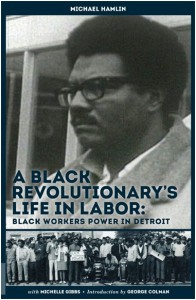
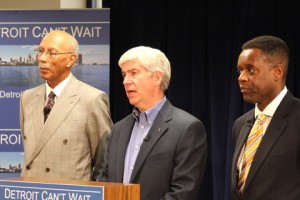
Michael Hamlin: Black Workers In Detroit
Last month, our guest, retired auto worker and activist Dianne Feeley discussed the plans of emergency manager of Detroit, Kevyn Orr that would wipe out the pensions and health benefits of all current and retired city workers. Nine billion in worker benefits are in the cross hairs of this plan that would impoverish 20 thousand retirees on fixed incomes. There are only 10 thousand city employees left in Detroit who’ve had their pay cut by 10 percent, and now their medical care. This has since made international news. Today we look at the history of workers in Detroit from the perspective of black workers and how what’s happening now can fit into the broader pattern of oppression.
Mike Hamlin:
- Well, I came here from sharecropping country in Mississippi. We landed in a suburb of Detroit that was segregated.
- My father was run out of Mississippi, just ahead of the sheriff. His sister lived out here. We lived in a project, 2 bedroom apartment. There were 8 of us in this 2 bedroom apartment. The people looked out and cared for each other. My mother was only 15 years older than me, so we grew up together.
- It was a peaceful community, sometimes interrupted by weekend drinking, arguing and spouse abuse.
- At that time we were so completely repressed and segregated. Those of us in the south were prepared for that because in the south you had to learn to keep your place.
- We’d submit and we played the game. Go to school or go to the factory.
- Most of my friends quit school and went into the factory. My father advised me to do the same but I wouldn’t.
- The factories at that time were hiring and he eventually got into Ford.
- Most of the workers there either worked at Ford or Great Lakes Steel.
- The typical pattern was they moved to the north got a job in the plant, bought a new car, I’m sure that created a lot -of angst.
- He used to be quite a cotton picker. The Ford job was like play to him. He worked a lot of overtime-kinda typical.
- The situation with the bankruptcy is kind of a culmination.
- If you know black history. . . there’s a history of destroying black communities that are prosperous.
- You look at Tulsa, Rosewood.
- There has always been bitter hatred in Michigan throughout on part of blacks toward whites.
- The racial aspect of this bankruptcy should not underplayed or underestimated.
- People outside of Detroit have been tearing it down since the 50s.
- There’s joy in Mudville now that Detroit is bankrupt.
- Quicken Loans gives his employees incentives to move into downtown lofts and apartment complexes.
- Detroit is going to prosper again.
- The population is changing. It was 85 percent black. It hasn’t been counted recently.
Guest – Mike Hamlin, co-founder of the Dodge Revolutionary Union Movement and the League of Revolutionary Black Workers. For 35 years, Hamlin worked as a social worker and addiction therapist. He is currently a professor of Africana Studies at Wayne State University.
——
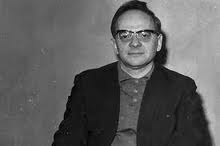
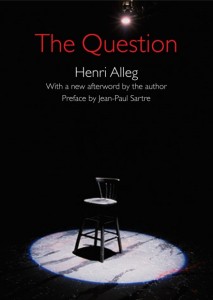
Remembering Journalist and Author, Henri Alleg
In November of 2007, we were fortunate to interview French-Algerian journalist Henri Alleg. Henri passed away last week. He was 91. We talked with him about his book, The Question, a moving account of his arrest and torture at the hands of French paratroopers during the Algerian War of Independence. The book became a bestseller and created major public debate in France. Jean-Paul Sartre wrote the preface that remains a relevant commentary on the moral and political effects of torture on the both the victim and perpetrator. The book was eventually banned by the authorities.
Professor Marnia Lazreg:
- I had worked on the issue of torture during the Algerian War 1954-62.
- I read Henri Alleg’s The Question. It really struck a chord with me.
- There were times in my research and writing where I lost complete faith in humanity or the notion of humanism.
- I lived in the Arab area in the city where I was going to high school and in the mornings I would see hundreds of men in line at the unemployment office.
- I read The Question and I realized he was speaking to me.
- He was tortured mercilessly, and he didn’t talk, he didn’t crack.
- He was the also the first French intellectual who blew the whistle on the hypocrisy of the colonial military establishment which was spreading this news that they were in Algeria to save this country.
- What Alleg wanted to do was show in a very powerful manner that France had not changed from the Middle Ages.
- In fact, France was engaging in the same practices 9 years after it fought fascism, Nazism in Europe.
- He was writing about what happened to him while it was still fresh in his mind. Memories become jumbled, the suffering is so intense.
- He was writing on cigarette paper and he had it smuggled out of the prison. It showed something about Alleg’s personality. He was not going to be muzzled, or silenced. He was going to continue to resist.
- What he said couldn’t be denied because he bore the signs of torture in his own flesh.
- Sarte asked how could such young men exhibit the same kind of hatred toward the Algerians and those that supported the Algerians.
- Alleg asked me to have dinner at his home. We had a marvelous dinner. With him I did not have to explain the premises of my views or my opinion.
- We never met before but I could talk to him and he could understand what I was talking about.
- We live in an age where humanism is a bad word. Anti-humanism is very well established in academic institutions.
- To me, Alleg represented perhaps one of the last figures of the humanist era. It was an era also when you had people who fought for what is human. What is worth dying for . . preserving that basic fundamental human dignity which characterizes all human beings regardless of their race, nationality.
Guest – Marnia Lazreg is professor of sociology at Hunter College and the Graduate Center of the City University of New York. Her books include Torture and the Twilight of Empire; From Algiers to Baghdad and The Eloquence of Silence: Algerian Women in Question.
Past Law and Disorder Interview with Henri Alleg
Past Law and Disorder Interview with Marnia Lazreg
———————————————————




























